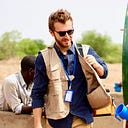“Alone in the face of sad fates” — perspectives from the East of Burkina Faso
Part one of a two-part series
In early April, unidentified armed men detained and questioned Yempabo Thiombiano* on his way home from work in Namoungou, a village in Burkina Faso’s East region. Then working as a guard at a once frequented hunting lodge and safari, Thiombiano had stopped at the market to buy bread. Upon leaving, he crossed paths with the militants as he rejoined his usual route home. Armed with Kalashnikovs, the men demanded his name, from where he was coming, and what he was doing there. They asked him where he and his family lived. After the questioning and after visiting his family’s home, they released him. The next day, he learned that these armed men had killed one of his colleagues the night before.
Fearing for his life and for those of his family, he decided to leave Namoungou in search of safer grounds. Thiombiano loaded his family into a small utility tricycle and left the village, not knowing when they would be able to come back. In the haste of their departure, they took nothing, leaving only with the clothes they were wearing.
Namoungou, like other villages on the outskirts of the regional capital Fada N’Gourma, has been increasingly affected by conflict caused by violent extremist organizations. Just last week on 07 August, unidentified armed men stormed the village’s cattle market killing more than 20 and injuring many more [1]. The East region has become one of Burkina Faso’s principal theaters of militant insurgency since mid-2018 when attacks against government buildings and other symbols of the state intensified. Spreading from Burkina Faso’s Sahel region and from the country’s tumultuous neighbors to the North, various violent extremist organizations made use of the East region’s large forested areas and limited state presence, as well as existing grievances between the region’s populations, to firmly implant themselves. Since the beginning of 2020, there have been over 100 security incidents in the region perpetrated by these groups, resulting in over 150 deaths [2].
As they left Namoungou, Thiombiano and his family joined the over 65 000 other individuals who have fled violence in the country’s East region [3]. Like over 20 000 of these Internally Displaced Persons (IDPs), he brought his family to Fada N’Gourma [4]. As the region’s largest city, Fada was the natural choice; “when you flee fearing for your life, you choose the most populated area as your safe place, not another village that can be attacked as well.” I learned of Thiombiano’s story when he settled with a close friend and colleague of mine* who happens to be an extended family member of Thiombiano’s. Settling with family, even if far removed, was the only real option, save setting up under a tree, said Thiombiano.
Arriving with nothing and without a source of revenue, he and his family have relied on their host family for their basic needs. My colleague vacated one of the buildings on his family plot for their use and has given them food from his stocks and water from his faucet. Hoping they would receive support from the government to reduce their burden on my colleague’s family, Thiombiano registered himself and his family with the government’s social services department. Nearly three months after his arrival, he has not received support from the government or any of the eight humanitarian response agencies providing emergency assistance in the East. Apart from their host family’s assistance, the support they’ve received has been from acquaintances who “take pity on [Thiombiano’s] situation.” Thiombiano says his most pressing needs now are food — rice, corn, and millet — and cash to purchase soap, medicine, and other essential goods.
Thiombiano and his family want to return back to Namoungou. In the village, he and his family were comfortable, accustomed to what they had and the life that they had created for themselves. He says he often feels ashamed as a result of the circumstances, embarrassed because he cannot provide for his family’s basic needs and because he believes he has become a burden on his host family. Due to the safety risk, however, he says he will return to Namoungou if and only if the security situation improves.
Thiombiano is pessimistic about the evolution of the security situation in the East. For him, no one is moving to address the current threats and their root causes. He foresees the situation only getting worse in the immediate term, as the motivations of these armed groups remain unclear. In response to the violence perpetrated by these groups, he says the government only seems interested in supporting certain parts of the country. He feels that the East region is being left behind, citing a lack of sufficient intervention by both state military and social protection entities as well as by the international community.
For Thiombiano, the population of the East region is living “alone in the face of sad fates.”
To support response efforts to the current humanitarian situation in Fada N’Gourma and the East region, consider contributing to Initiative: Eau.
*names changed or omitted for privacy
References:
[1] Governorate of the East Region, Administrative communiqué, 07 August 2020, https://bit.ly/2PJytTQ
[2] ACLED, Armed Conflict Location & Event Data Project (ACLED) Codebook, 2020, http://www.acleddata.com
[3] SP/CONASUR, IDP Situation by commune, 09 July 2020, https://bit.ly/2PJUHVH
[4] Provincial Directorate of Social Action of Gourma, IDP Situation of Fada N’Gourma, 09 December 2020
